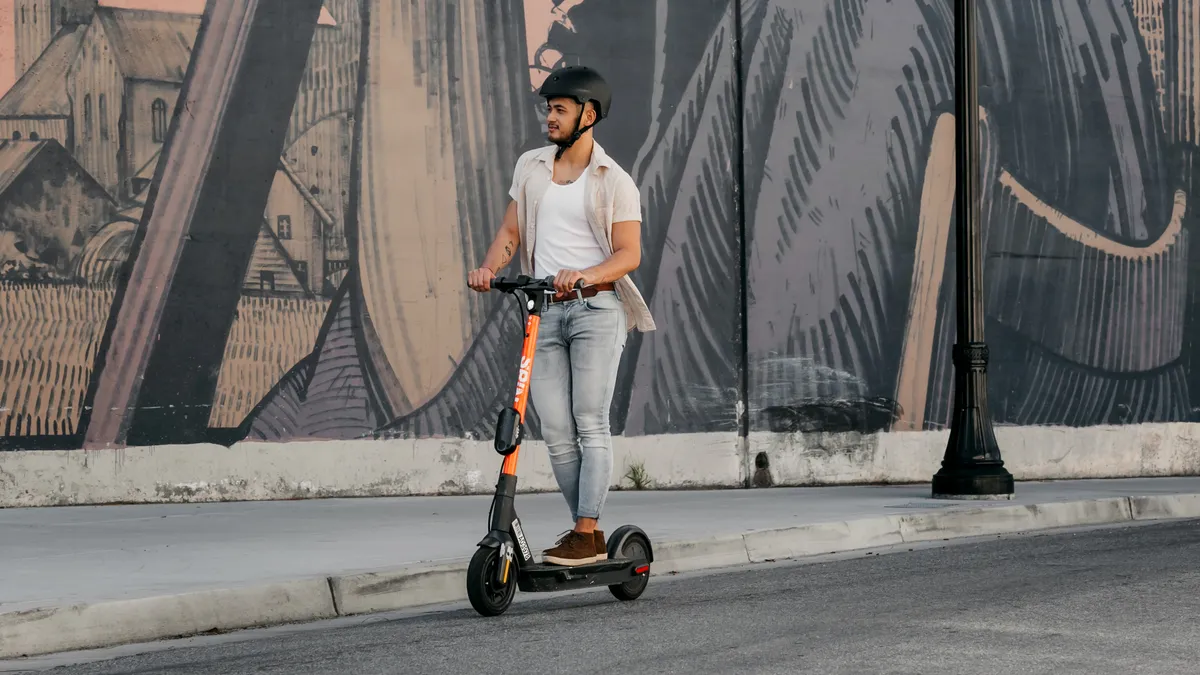Dive Brief:
- Micromobility data management platform Populus unveiled a new guide, "Micromobility Data Sharing And Cities," to assist cities and private operators in effectively sharing data and managing curb space.
- The report outlines mobility data needs and use cases; methods for data sharing and analysis; and information on data privacy challenges. These sections further detail a number of common topics like data standards and the current micromobility regulatory landscape.
- The report follows Populus' testimony in a California Senate hearing on recently introduced bills that could potentially "restrict cities abilities to access data," Populus CEO and Co-Founder Regina Clewlow told Smart Cities Dive in an interview. She said Populus developed this guide "so cities could very clearly articulate what types of data are needed for what types of transportation policy and planning goals."
Dive Insight:
As the micromobility landscape evolves, cities and operators have run into a number of data-sharing challenges. An ongoing dispute between Uber and the Los Angeles Department of Transportation (LADOT) regarding JUMP vehicle data is one of the most high-profile examples of these challenges: while LADOT imposes a Mobility Data Specification (MDS) for all operators to share real-time vehicle data with the agency, Uber has argued MDS is a violation of the U.S. Constitution's Fourth Amendment, and of California's Electronic Communications Privacy Act (CalECPA).
In speaking on this matter, Clewlow said potential violation of CalEPCA is "one of the key elements that makes it seem more likely that JUMP could win this," if they continue to pursue the dispute — a decision that lingers amid Uber's recent decision to fold JUMP's business under Lime's operations.
In an email to Greater Greater Washington, Uber's Director of Public Affairs Colin Tooze said Uber maintains its position on "the dangers of government demands for real-time data on individuals' movements," despite its recent deal with Lime.
Aside from this challenge in Los Angeles, Clewlow said local governments nationwide could gain more insights and best practices for sharing and using data effectively and practically. The report highlights the cost and technical benefits of partnering with private sector third-party platforms (like Populus) for data use and analysis, and also highlights the importance of utilizing public surveys to supplement information that can't be collected from data directly.
"Vehicle and trip data does answer a lot of questions about, for instance, are vehicles being distributed in low-income neighborhoods? Are trips occurring to and from transit? But they don’t actually answer a lot of the other key questions that cities have," Clewlow explained.
She said when it comes to surveying micromobility users, "there's best practice, and then there's what's practical." Methods of "representative sampling" may be the most effective way of surveying and analyzing riders, but it's very expensive, therefore "convenience-based surveys" are more practical for city budgets.
Outside of this report, Populus has released other insight- and data-driven work to help cities manage micromobility programs, particularly amid the COVID-19 pandemic. For instance, the group launched its Open Streets Initiative in late April to assist city officials in designing and implementing new street policies spurred by the pandemic, like car-free streets.
"Most major metros are bringing back micromobility, and are also implementing really key changes to how we use streets," Clewlow said. She suggested a greater use and understanding of data and communication tools can aid in a smooth implementation of these changes for cities.












